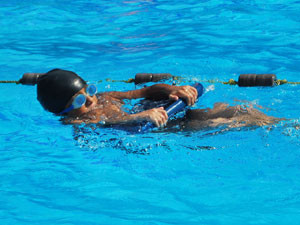 Four Southwest Florida drowning deaths have occurred in less than a month, prompting authorities and safety advocates to renew calls for better water-safety awareness as we head into the tourist season.
Four Southwest Florida drowning deaths have occurred in less than a month, prompting authorities and safety advocates to renew calls for better water-safety awareness as we head into the tourist season.
The Naples Daily News reported child safety officials are pledging to beef up education campaigns to families about never letting their guard down and following safety practices. One child drown at a pool party, another died after a sliding door was left open. A third drowning death reportedly involved an autistic child. Charlotte County authorities have released few details about a fourth drowning death under investigation last week.
With drowning deaths in all three of Southwest Florida’s coastal counties, authorities are reminding residents to practice open water safety, but to not forget the risks posed by backyard swimming pools. Two drowning deaths in Collier County, a drowning death in Lee County, and the drowning death in Charlotte County all involved swimming pools. Florida leads the nation in the number of private swimming pools.
Fort Myers injury lawyers know the state’s more than 1 million residential swimming pools pose a significant risk to the public. Children are at especially high risk, but vacationers and tourists visiting during the winter months also face increased risk of drowning or near-drowning accidents.
Swimming Pool Liability in Southwest Florida
Lapses in adult supervision and lack of pool safety features as mandated in the Preston de Ibern/McKenzie Merriam Residential Swimming Pool Safety Act (Florida Statutes, Chapter 515) contribute to these needless and preventable tragedies.
Each year, there are about 50 reported drowning deaths of children under age 5 in residential swimming pools in Florida, according to drowning data maintained by Florida State University. Over 60 percent of all the state’s drowning deaths occur in swimming pools. Most of these cases will proceed against a homeowner’s insurance policy.
But our injury lawyers in Fort Myers and Cape Coral see a number of cases involving hotels and resort swimming pools. Drownings or near-drownings at short-term rental units and other seasonal accommodations may also involve a commercial liability insurance policy. FOX4 reported earlier this year that more than 700 public swimming pools in Lee County had failed state-mandated water-quality safety testing, which has resulted in a number of non-drowning injuries.
Seasonal Swimming Pool Safety
Most residential swimming pools in Florida include a number of safety features, like door alarms and locking gates, as mandated under the Preston de Ibern/McKenzie Merriam Residential Swimming Pool Safety Act. Other cases involving commercial or rental properties may have additional safety obligations.
Southwest Florida homeowners with visiting guests should be particularly mindful of the risks. Giving a safety briefing on swimming pool rules and ettiequte is a good idea, and should be standard procedure for anyone who accepts the liability of having a swimming pool in their home.
The Lee County Injury Prevention Coalition offers a number of drowning-prevention safety resources. Special care should be taken to educate children and other young visitors who will be spending time in close proximity to a swimming pool.
If you or a loved one is injured, call Associates and Bruce L. Scheiner, Attorneys for the Injured, at 1-800-646-1210.
 Florida Injury Lawyer Blog
Florida Injury Lawyer Blog





